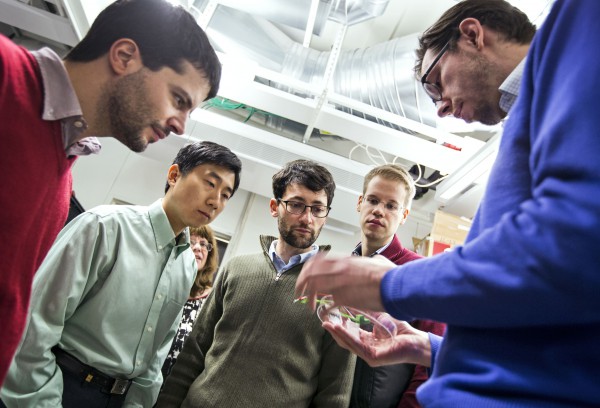Winners of Science & SciLifeLab Prize visited SciLifeLab in Stockholm
Following the award ceremony at Grand Hotel on December 9th , the winner of Science and SciLifeLab Prize and the three runner-ups came to SciLifeLab in Stockholm for an open seminar and a tour of the unit.
On December 10th, the program for Science and SciLifeLab Prize continued with an open seminar in Solna. Following lectures by the grand prizewinner and the three runner-ups, the work at SciLifeLab in Stockholm was presented by three of the center scientific directors: Jussi Taipale, Mathias Uhlén and Gunnar von Heijne.
“One of the things that I am most proud of is that we have 100 bioinformatics experts here at SciLifeLab to analyze the data generated at the center. That is a very good and important service” said Mathias Uhlén, Director of SciLifeLab.
“We want to integrate the three universities in Stockholm into one research environment together with Uppsala. SciLifeLab is an important step to reach that.” said Gunnar von Heijne, Professor at Stockholm University.
Jussi Taipale gave an outline of the research at Karolinska Institutet performed at SciLifeLab, which focuses on translational medicine and human proteins. Gunnar von Heijne presented the Bioinformatics platform of the center, where the Norway spruce genome was analyzed while Mathias Uhlén described the land winnings of the Human Protein Atlas project which was recently updated with RNA-transcript data for 27 specific tissues.
“Thanks to new technologies, we are cloning 40 new human genes every day and generate 10 000 tissue images every day in this project. In collaboration with 150 researchers in 16 countries we have come a long way in mapping the expression and distribution of proteins in the human body.” said Mathias Uhlén.
The seminar was followed by a tour in the labs. Helene Andersson-Svahn showed a microfluid assay that has been optimized by her group at at SciLifeLab, which allows analysis of single cells. The system could be used for analyzing low expression cell surface proteins and for high-throughput screening for industrial enzyme production. Joakim Lundeberg demonstrated the sequencing robots of the National Genomics Infrastructure platform.
“Today we sequence 3 million base pairs, or one bacterial genome per second. We are currently expanding our instrument park and soon we will be able to double the sequencing rate, making us the second largest sequencing lab in Europe.” said Joakim Lundeberg.





